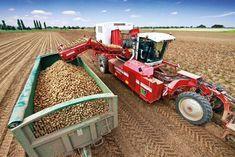
AH Worth, parent company of QV Foods has teamed up with Tamar Energy to build an anaerobic digestion (AD) plant at Holbeach Hurn in Lincolnshire.
The plant is expected to be operational in summer next year and to produce 11 million kilowatt hours of electricity a year.
This development will be Tamar Energy’s first AD facility following a £65 million equity financing completed by the company in February 2012. The new plant is located at one of the largest potato processing sites in the UK, which supplies produce to the UK’s major national retailers.
Discarded organic material from the packing lines and storage facilities will be diverted to the AD plant instead of being transported for stock feed, composting or to landfill.
Some 500 people work at the site, and most of the power demand will be met by the AD plant, resulting in a significant cost saving.
Other benefits include reduction of waste management charges, organic fertiliser production on site, energy recovery from waste, and process heat available on site.
Some 360,000 tonnes will be treated in the plant every year and it will have an electrical output of some 1.5 MW - equivalent to the yearly consumption of some 3,000 households.
QV Foods will harness the large majority of the electricity production, with any surplus being delivered as green electricity to the National Grid.
Duncan Worth, chairman of QV Foods said: “This is the culmination of considerable effort. The construction of an AD plant at our site makes sense for AH Worth and QV Foods on both an economic and an environmental level and is part of our business’s long term sustainability planning. The site prepares potatoes and vegetables for leading national retailers including Asda, Aldi and Marks & Spencer and we are delighted to be able not only to reduce our own carbon footprint, but also to be able to demonstrate how AD could positively impact their carbon reduction goals.”
Alan Lovell, chairman and chief executive of Tamar Energy concluded: “This will be the first of many Tamar plants in partnership with the food manufacturing sector. Tamar Energy is well capitalised by strategic and institutional investors, with a pure focus on producing energy from organic waste rather than as an adjunct to a waste-management business.”



